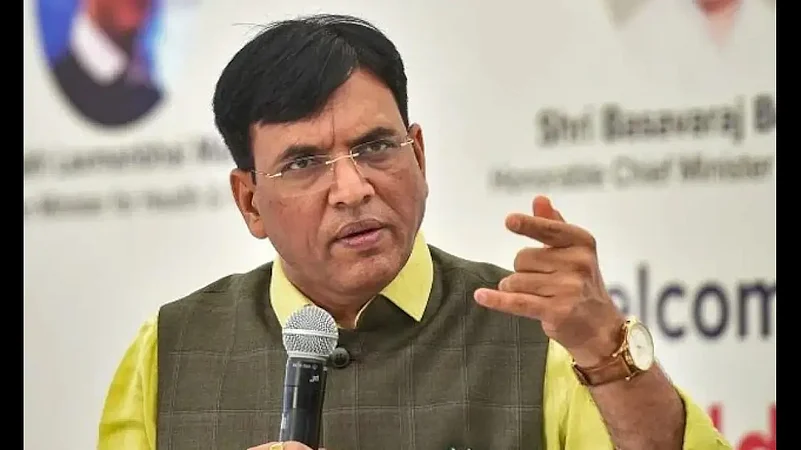The government has set up 1.22 lakh Ayushman Bharat Health and Wellness Centres and will achieve the target of 1.5 lakh such centres by the end of this year, Health Minister Mansukh Mandaviya informed Rajya Sabha on Friday. These Ayushman Bharat Health and Wellness Centres are working on a holistic approach and have facilities such as e-Sanjeevani platform, online outpatient consultation service through telemedicine and teleconsultation.
"By the end of December, 1.5 lakh Ayushman Bharat Health and Wellness Centres will be available to serve the country," Mandaviya said while replying to a discussion on the Right to Health Bill, 2021, a private member's bill introduced by RJD MP Manoj Jha last month seeking free healthcare for all.
The minister said under this scheme, the government is converting all primary health centres into Ayushman Bharat Health and Wellness Centres. The central government is assisting states in this project. "The prime minister had in 2017-18 decided to set up 1.5 lakh Health and Wellness Centres," he said, adding that it is going to be executed now.
On an average, each of these centres will cater to 7,000 to 8,000 population and will have facilities for 13 kinds of health screening tests along with consultation. "These centres would also conduct yoga classes for wellness twice a week. Kids would be vaccinated and pregnant women's health conditions would be monitored. These would have test facilities for non-communicable diseases," he added.
These would have facilities for screening of oral cancer, cervical cancer and breast cancer. The government is working to make healthcare accessible and affordable for the common people, the minister added. The minister further said the Ayushman Bharat Health Infrastructure Mission, with an outlay of Rs 64,000 crore over the next five years, will take India's public health facilities and infrastructure to new heights.
He cited some success stories under the Ayushman Bharat scheme, which he said offers a type of universal healthcare to people. India crossing the 200-crore COVID-19 vaccine doses mark within 18 months of beginning the drive underlined the strength of the nation and its strong vaccine research and management capabilities.
The meticulous vaccine management and planning ensured there were no shortage of syringes and doses, and India's health efforts were appreciated by the world, and acknowledged by leading experts in the field. Vaccinating nearly 85 per cent of the eligible adult population protected people during the third wave of Covid, he said.
The minister said that the government is aware that more needs to be done and the gaps will be addressed through Ayushman Bharat Health Infrastructure Mission. The mission, where proposed average spends are pegged at Rs 100 crore per district, will look to bolster facilities at all levels, through critical care units, testing labs, and strong surveillance system units.
He listed the benefits of digital health accounts under the Ayushman Bharat Digital Health Mission, and said more than 20 crore people have opened their health accounts. The minister said that an expression of interest has be brought out for monkeypox vaccine research, and "whichever state government wants to participate in monkeypox vaccine research, you can apply in that."
Besides, the government is also addressing the issue of the lack of medical professionals and now the total number of medical colleges in the country has gone up to 622. "Number of seats (MBBS) has become double now to one lakh from 55,000 in last seven years," he added. The WHO suggests having a doctor for every one thousand population and India has 13 lakh MBBS doctors and 5.5 lakh Ayush doctors.
"Now we have a doctor available on every 800 people," he said. The government has also increased the budgetary outlay for the health sector and according to Mandaviya, when the NDA government come to power in 2014, the budget for the health sector was Rs 33,000 crore, which has increased substantially.
"For FY 2022-23, it is now Rs 83,000 crore," he said. In 2017, the government declared a national health policy. On the concerns about India's GDP to health ratio, Mandaviya said, "We have decided to take it to 2.5 per cent in the coming years." While participating in the debate, Radha Mohan Das Agarwal of the BJP said that in order to provide better health facilities to the citizen, the right to health is not required. What needs to be ensured is that funds are not pilferage and reach the poor people.
He also lauded the health infrastructure of Kerala and said this was achieved by the state government without introducing a right to health. Dr Ashok Bajpai of the BJP said there is a lack of doctors at health centres and the government is working to address the issue by opening new medical colleges. This will also address the ratio of availability of doctor against increasing population, he added.
The government is also working towards opening new AIIMS and other initiatives such as Ayushman Yojna and providing generic medicines to the common people through Jan Aushadhi. Ajay Pratap Singh of the BJP also participated in the debate.
(With PTI inputs)


























